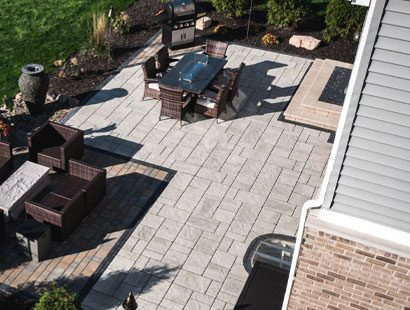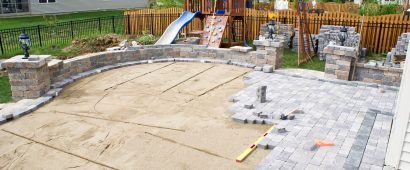5 Fall Fertilizing Mistakes to Avoid for a Healthier Lawn
Why We Always
Design in 3D


Taking care of your lawn can feel like guesswork, especially in the fall. Do you fertilize now, later, or skip it altogether? Use the bag in your garage, or buy something new? As a Midwest homeowner, you want your yard to bounce back from summer stress and stay healthy through winter, but the steps aren’t always clear.
Since 2007, Midwest Landscape has helped homeowners in Northwest Indiana transform their properties, and we’ve seen the same lawn care mistakes made year after year, including:
- Not fertilizing at all
- Not fertilizing at the right time
- Using too much fertilizer
- Using the wrong fertilizer
- Not prepping the lawn
These simple errors can prevent your lawn from reaching its full potential. Let’s take a closer look at these common fall fertilization mistakes and how to avoid them.
Can I Skip Fertilizing in the Fall?
No, fall fertilization is arguably the most important feeding of the year for your lawn. While spring feeding helps with initial greening, fall applications focus on strengthening the root system. This process helps your grass store essential nutrients, allowing it to survive the winter and grow more quickly and healthily when spring arrives.
Does Timing Really Matter?
Yes, timing is crucial for effective fertilization. For Midwest lawns, the ideal window is between late September and early November, after the summer heat has passed but before the ground freezes. Fertilizing too early while the grass is still in its peak growing phase can waste nutrients on leaf growth instead of root development. Applying it too late, after the ground has frozen, means the fertilizer won’t be absorbed and will provide no benefit.
Isn’t More Fertilizer Better?
No, over-applying fertilizer can do more harm than good. The temptation to add a little extra for a greener lawn can lead to chemical burns on your grass blades. Excess fertilizer also contributes to environmental pollution as it runs off into local waterways. Always follow the instructions on the product label and use a spreader to apply the correct amount evenly across your lawn.
Can I Use the Same Fertilizer I Used in Spring?
You should use a fertilizer specifically formulated for fall application. Spring fertilizers are designed to promote lush, green leaf growth, but fall blends are different. They are typically higher in nitrogen and other key nutrients that support deep root development. Using a specialized fall fertilizer provides your lawn with exactly what it needs to build strength for the upcoming winter.
Do I Really Need to Prep the Lawn First?
Yes, proper preparation allows the fertilizer to work much more effectively. Before you apply fertilizer, mow your lawn one last time, cutting it slightly shorter than usual. It’s also important to rake away any leaves or debris that could prevent the granules from reaching the soil. If your soil is compacted, aerating it will improve nutrient absorption. After applying the fertilizer, water the lawn lightly to help it settle into the soil.
Give Your Lawn the Best Start for Spring
Avoiding these five common mistakes will make your fall fertilization efforts simple and highly effective, setting the stage for a beautiful lawn next year. A healthy, well-fed lawn is better equipped to handle the stresses of winter and will reward you with vibrant growth in the spring.
If your lawn is struggling and needs more than just a seasonal feeding, don’t worry. The experts at Midwest Landscape offer professional seed and sod installation to restore dying lawns and keep them looking their best. Contact us today to get the lawn you deserve.

Financing Your Dream: Finance
with Ease
- Immediate Start: No money down.
- Zero Interest Option: 0% same as cash for 12 months.
- Extended Plan: 6.99% interest over 60 months.
- Generous Limits: Finance up to $75,000.
- Quick Approvals: Get approved in just 5 minutes.
Are You
Ready to Start
Your Project?
Let us assist you.
Let us know what you’re envisioning, and we’ll get in touch
right away to schedule an appointment to examine
your site, learn about your goals, and provide expert
recommendations.






